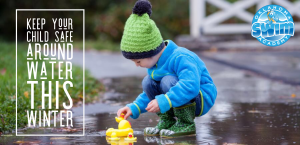FALL/WINTER: WATER SAFETY TIPS
Blog

At Oklahoma Swim Academy, we strive to keep our swimmers safe all year round. Our safety mission does not end when our students walk out of our doors. Water safety in the winter is often overlooked, but can prove to be very dangerous. Without the proper precautions in place, tragedy can strike at any time.
Sadly, 75% of drowning incidents for children under 15 years old happen in residential pools. Of the 3,786 drownings in 2016, over 12% were children under the age of 4. This number is too high and we are committed to increasing awareness to make our communities safer. While residential pools are the most common, an accident can occur in bathtubs, toilets, fountains, and even buckets. Never let your children go around water unsupervised and make sure to give them your full attention when you are watching them; distractions make for tragedies. Drowning is preventable. You can take the following steps to make sure your home is a safer place all year long.
PORTABLE & INFLATABLE POOLS
Portable and inflatable pools are immense fun in the summer, but we all know what a drag it is to deflate them at the end of the season. So why not just leave them out? These types of pools can fill with rainwater or melted snow, creating a dangerous situation for little ones. Drowning can occur in less than 2 inches of water, so it is important to make sure your inflatable and portable pools are stored away properly at the end of the season.
ABOVE GROUND POOLS & HOT TUBS
Above ground pools and hot tubs can be dangerous if not covered well, with all ladders and step stools removed . Being both curious and clever, children will use anything as a means to get into these areas. Fences, gates and alarms for pools and hot tubs are also highly recommended. These barriers help create a safe environment that discourages little ones from finding themselves in areas they should not be alone.
POOL COVERS VS. SAFETY COVERS
Do you know the difference between a pool cover and a safety cover? Pool covers market themselves as being ‘solid’ covers, however, are not completely solid. Take two steps onto a pool cover and you will sink. Sure, they keep out sunlight that can develop algae in your pool, but they are also a safety hazard for your children. A safety cover, although it may not be as effective in keeping algae out, will keep your children safe. Look into swapping your pool cover for a safety cover.
OTHER IMPORTANT TIPS
A few final tips for water safety this winter: Communicate with your family about playing on thin ice and the dangers of it breaking. If your child is in swim lessons, ask your swim instructor to give a winter clothing test, ensuring that your child can self-rescue in the case of an aquatic accident during the fall/winter months. Before getting into a body of water, make sure it matches your child’s skill level. If a child is missing and there is water in the area, check the water first. Lastly, swim lessons are not just for children. If you feel like you can better your swim skills, do it. If not for yourself, but for your loved ones. You will not regret it.
